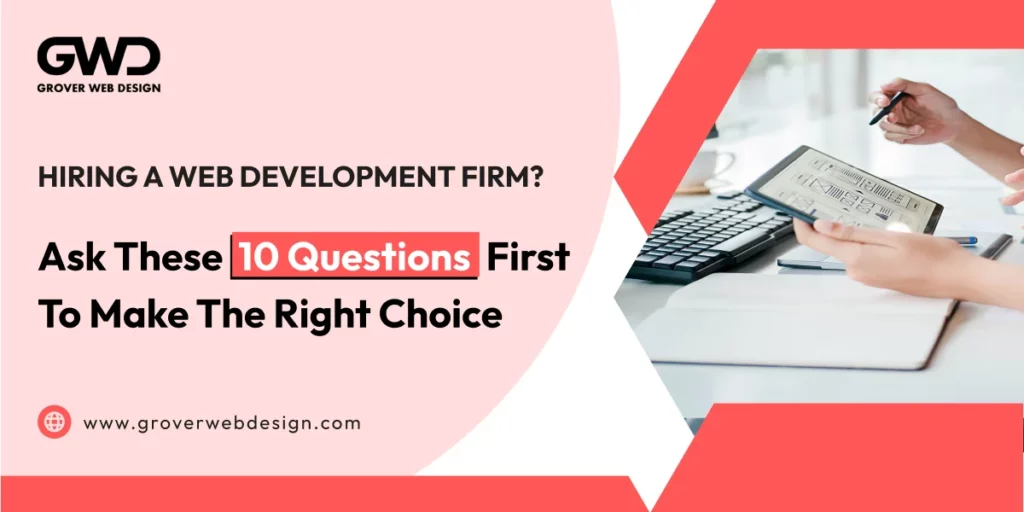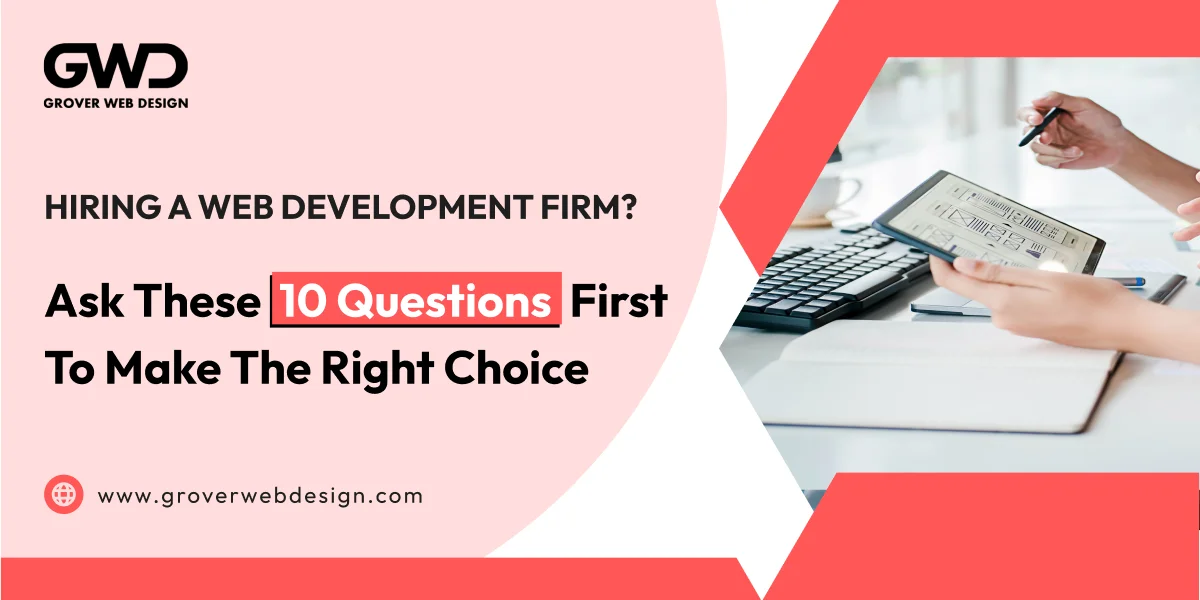
Hiring a Web Development Firm? Ask These 10 Questions First to Make the Right Choice
Hiring a Web Development Firm? Ask These 10 Questions First to Make the Right Choice

Introduction: Why Asking the Right Questions Matters
Choosing a web development partner is more than just ticking boxes or picking the first firm you find online. Your website is a cornerstone of your business—it represents your brand, connects you with customers, and drives your goals forward. Rushing this decision or skipping a thorough vetting process can lead to delays, unexpected expenses, and ongoing headaches.
Asking the right questions from the start helps you avoid costly surprises. It gives you a clear picture of each firm’s skills, transparency, and reliability. With a focused approach, you can weed out firms that don’t fit your vision before you invest too much time and energy. This not only saves money but also spares you the frustration of fixes and do-overs down the road.
What’s really at stake? The success of your online presence and, by extension, your long-term business growth. The firm you choose will shape how your brand shows up online, how smoothly things run, and how secure your site is. By knowing what to ask, you set yourself up for a stress-free collaboration and a website you’ll be proud to call your own.
Question #1: What Is Your Experience in My Industry?
Why Industry Experience Is Critical
No two industries are exactly alike. Each sector comes with its own quirks—from audience expectations and visuals to compliance and technical requirements. When a web development firm understands your field, they can anticipate challenges and design with your goals in mind. This experience cuts down on communication issues and helps prevent costly mistakes down the line.
How to Evaluate Industry Knowledge
Start by asking for projects similar to yours. Did the developer build for e-commerce, SaaS, healthcare, or another field like yours? Look for examples where they handled the same kind of content, regulations, or user journeys. Their work should show they grasped both the technical and messaging needs of those businesses.
Checking previous work isn’t enough. Ask thoughtful questions about challenges they’ve tackled in your sector. Can they discuss specifics, like overcoming a privacy hurdle or boosting conversions with a certain audience? If their answers are vague or off-point, consider it a warning sign.
Working With Someone Who Gets Your Audience
A developer who understands your target audience’s habits, frustrations, and preferences can shape features and content that actually resonate. This means a smoother launch and faster wins for your business.
As you research potential partners, keep digging into their client backgrounds to make sure their prior work lines up with your ambitions.
Question #2: Can I See Your Portfolio and Client References?
Reviewing a Portfolio: What to Look For
A developer’s portfolio gives you an unfiltered look at their skills, style, and range. Don’t just scroll through screenshots—dig in. Evaluate whether their previous projects show not only visual appeal, but also functionality and user experience. Look for examples similar to your business in size or complexity, and ask yourself if you feel confident in their ability to solve challenges like yours.
Pay special attention to details: Do their sites load quickly? Are they mobile responsive? Do they balance creativity with navigation ease? These clues reveal if a team has experience building practical, not just pretty, websites.
The Importance of References and Testimonials
Reading client testimonials gives insight into what it’s actually like to work with the developer. Reach out to the references provided and ask about communication, timeliness, and results. Satisfied clients will gladly share their experiences—be wary if references are vague or difficult to contact.
Red Flags to Watch For
Be on the lookout for red flags in portfolios, such as:
- Sparse or outdated work
- Overly generic examples
- No clear demonstration of completed projects for real clients
If something doesn’t add up, trust your instincts.
Now that you know how to spot quality and gather proof of experience, it’s time to explore how web developers actually bring your project to life.
Question #3: What's Your Design and Development Process?
Understanding the Full Journey
A solid web development process gives you clarity and builds trust. Typically, a project moves through several core stages: planning, design, development, testing, and launch. In the planning phase, expect in-depth discussions about your goals, audience, and features. This sets a roadmap that guides design decisions and keeps the team (and you) focused.
During the design stage, the developer will share wireframes or mockups. This is your chance to give feedback and ensure the look fits your brand. In the development phase, the designs are turned into a working website, with updates to keep you in the loop. Testing is a crucial step — here, bugs are squashed and performance checked before your site goes live.
Why a Structured Process Matters
A clear method shows professionalism and reliability. Developers who follow set milestones and share regular updates are less likely to miss deadlines or misunderstand your needs. Look for firms that encourage your feedback at key points. Your involvement should be active where it counts — especially in planning and reviewing designs.
With the right process in place, you’ll stay informed and confident as your website comes to life, ensuring a smooth transition into the next phase of your project.
Question #4: How Do You Handle Pricing and Payment Terms?
Understanding Pricing Models
When discussing costs with a web development firm, you’ll notice a range of pricing models. Most teams offer hourly rates, flat project-based fees, and sometimes ongoing retainers for support and updates. Hourly billing can be helpful for small, undefined projects or when you want flexibility. Project-based pricing gives you a fixed total cost, which works well if your needs are clear at the start. Retainers allow you to spread costs over time for ongoing support.
Spotting Hidden Costs and Ensuring Transparency
A trustworthy developer will openly discuss all charges upfront, from design to development to launch. Be sure to ask what’s included and what’s extra. Hosting, premium plugins, ongoing maintenance, and post-launch changes are common areas where fees can sneak in. Request an itemized estimate so there are no surprises. Transparent pricing means you won’t face mystery charges when the invoice arrives.
Payment Schedules and Best Practices
Most firms ask for an initial deposit, then set clear milestones for additional payments as your project progresses. A typical schedule might be 30% upfront, 40% at a midway point, and the final 30% upon launch. This helps you manage your cash flow and keeps everyone accountable. Always review contracts carefully and make sure deadlines and deliverables are tied to payments.
Establishing clear financial terms up front helps build trust and sets your project up for smooth progress.
Question #5: What Technology Stack Do You Use?
The Importance of Technology Choices
The tools and programming languages your website is built with impact everything—from how fast your pages load to how easily your team can manage new content down the line. A web development firm's technology stack can shape your site’s security, performance, and ability to scale as your business grows.
Key Questions to Ask
When you talk with a potential web partner, ask about the content management systems (CMS) they use. Do they recommend WordPress, Shopify, or a fully custom solution? Each option has its own pros and cons around flexibility, ease of use, and ongoing costs. Make sure the developer is open to customizing features for your specific needs without locking you into expensive or proprietary platforms.
Matching Tech to Your Business
Above all, ensure the technology aligns with your business goals. An e-commerce store has different needs than a digital portfolio or a blog. The right development team will explain why they recommend certain tools and how their stack supports future updates and integrations.
Understanding the technology behind your website cuts down on surprises and sets you up for smooth, worry-free growth. This clarity in tech choices builds confidence for whatever you need to consider next.
Question #6: How Do You Approach Website Security?
Essential Features for a Secure Website
Security should never be an afterthought. Every website needs a strong foundation to keep data safe and maintain trust. Look for features like SSL certificates for encrypted connections, robust firewalls, and regular backups that protect both your business and your users. Multi-factor authentication and strong password policies add another layer of defense. These basics help prevent the most common cyber threats.
Ongoing Security Maintenance
Securing a website isn’t a “set it and forget it” task. Ask your web development firm how they handle updates and patches. A quality team will monitor for vulnerabilities and swiftly apply changes when new risks appear. Ongoing support means proactive, not just reactive, protection—keeping your site secure as threats evolve.
Protecting Data and Meeting Compliance
Your website will likely handle sensitive user information. Reliable developers understand the importance of data protection laws and industry standards. They should offer guidance on compliance—from GDPR to payment processing standards—ensuring customer privacy and trust aren’t compromised.
Solid website security builds confidence and credibility. Next, you’ll want to look at what happens after your site launches and the support available to you.
Question #7: What Post-Launch Support Do You Offer?
Understanding Support Packages
Launching a website is just the beginning. Ongoing support ensures your site remains updated, secure, and fully functional. Web development firms often offer support in several ways, such as monthly maintenance plans, pay-as-you-go options, or custom packages. Typically, support includes fixing bugs, making small updates, updating plugins, and monitoring site health. Choose a package that matches your technical confidence and business needs.
Response Times and Emergency Assistance
It’s critical to ask how quickly you can expect help if something goes wrong. Some firms offer guaranteed response times within standard business hours, while others provide 24/7 emergency assistance for critical issues. Look for clarity around support channels—whether that’s email, live chat, or phone—and check client references to verify these claims in practice.
Evaluating Long-Term Value
Support isn’t just about urgent fixes. Long-term value comes from proactive updates, helpful advice, and regular performance checks. Reliable partners provide ongoing training, guidance on best practices, and an evolving roadmap for your website. Investing in robust support now can prevent downtime, protect your investment, and give you peace of mind moving forward.
Next, it’s important to think about how your site will be discovered and perform in search results.
Question #8: How Do You Optimize for Search Engines and Performance?
Building With Search and Speed in Mind
A beautiful, functional website is only half the battle—your site needs to be easily found and fast to load. Good web development goes hand in hand with search engine optimization (SEO) and performance optimization. If your site is slow or not built with SEO fundamentals, you’ll struggle to rank, no matter how great your content is.
Key Metrics and Practices to Ask About
When meeting with a developer, ask about the specific SEO tools and tactics they use. Do they build sites with clean, crawlable code? Are they knowledgeable about on-page SEO basics like title tags, meta descriptions, image alt text, and mobile responsiveness? For performance, ask how they ensure your site loads quickly—whether through caching, image optimization, or minimal use of heavy scripts.
Important metrics include:
- Page load time
- Mobile performance
- Core Web Vitals (like Largest Contentful Paint and Cumulative Layout Shift)
- Functionality for easy SEO updates
Setting Up for Long-Term Visibility
A developer should build your site with lasting search visibility in mind. That can mean integrating easy-to-use tools to update content, structuring URLs wisely, and setting up analytics for ongoing tracking. This ensures you’re not just launching a great site today, but setting up for digital success over time.
The work doesn’t stop here—choosing the right firm means finding one that fits your culture and stands apart from the competition.
Question #9: What's Your Communication Style?
Why Communication Sets the Foundation
Great website projects depend on open, clear dialogue. When your development team communicates well, you always know what’s happening—and what’s next. Regular updates help build trust, avoid misunderstandings, and keep everyone aligned toward your goals. If a firm is slow to respond or vague in their explanations during early conversations, that’s a sign of possible project delays down the road.
Evaluating Responsiveness
Before signing any contract, test their responsiveness. Notice how quickly they reply to your calls or emails. Are their answers thorough, or do they miss key details? A good development partner values your questions and follows up quickly. You want a team that’s proactive, not reactive.
Setting Update Expectations
Agree in advance on how frequently you’ll get progress reports or check-ins. Clear communication standards might include:
- Weekly or biweekly status updates
- Project management tools with shared visibility
- Single points of contact for questions
When everyone knows the communication plan, you’re less likely to feel left in the dark. Being deliberate about this upfront paves the way for a transparent relationship and fewer surprises along the way.
Question #10: What Makes Your Firm Different from Competitors?
Finding the Standout Qualities
When comparing web development firms, it’s easy to focus on price alone. But there's a lot more at stake than initial costs. The unique strengths and specialties a developer brings to the table can make a big difference in your overall experience and the final product.
Look for teams with proven expertise. Do they have creative problem-solvers? Are they always learning about new technology? These qualities foster innovative solutions and keep your website competitive. Consider how they handle feedback and if they offer tailored strategies instead of one-size-fits-all templates.
Evaluating Fit and Values
Cultural fit often flies under the radar but is key to a productive partnership. Ask yourself: do their communication style and values align with your company? A great fit means smoother collaboration, better mutual understanding, and results that actually reflect your brand’s voice.
Beyond the Price Tag
Cheapest isn’t always best. Weigh the value of solid communication, transparency, and long-term support. These can save you from headaches and extra expenses down the road.
A web partner who stands out won’t just build your site—they’ll set you up for long-term growth and success.
Ready to move forward with confidence? Let’s look at how to compare all these responses and take the next steps.
How Grover Web Design Answers These Questions
Our Approach and Experience
At Grover Web Design, we believe in combining deep industry experience with a tailored, client-first approach. Our team brings years of work across diverse sectors, so we understand the nuances that make your business unique. We adapt our strategies to your industry’s specific needs rather than offering one-size-fits-all solutions. By closely examining your target audience, business goals, and market, we ensure your site is both functional and impactful.
Transparent Process and Client Satisfaction
Transparency sits at the heart of everything we do. From the first conversation, we clearly outline our design and development process, including timelines and milestones. You’re never left wondering where things stand. We provide straightforward pricing—no hidden fees, just honest estimates—so you can plan with confidence. Our clients are involved at every major step, encouraging regular feedback and keeping projects aligned with your vision.
What Sets Us Apart
What truly differentiates Grover Web Design is our commitment to building long-term partnerships—not just websites. We prioritize open, ongoing communication, focused on your satisfaction and long-term growth. Our team constantly learns and innovates, ensuring every project leverages modern best practices. Our blend of expertise, transparency, and dedication helps you turn vision into reality, with confidence every step of the way.
Next Steps: Making Your Final Decision
Comparing Web Development Firm Responses
Once you’ve gathered answers to the key questions, it’s time to look at the bigger picture. Lay out all the responses you’ve received and review them side by side. Focus on clarity, detail, and honesty in each answer. Did the firm offer specific examples, or were the replies too generic? Consider the consistency between their portfolio, client feedback, and promises made during your conversations.
Trusting Your Instincts
Beyond facts and figures, don’t underestimate your gut feeling. Was the team approachable and attentive during discussions? Did their approach make you feel confident about working together? Trusting your instincts can help prevent headaches down the road, especially if a firm’s communication style aligns well with yours.
Taking Action
When you’re ready, start by notifying your chosen partner and arranging a kickoff meeting. This is a great time to clarify expectations, confirm your project’s scope, and establish communication protocols. Don’t forget to revisit the proposal and contract to ensure everything is as discussed. Thorough planning at this stage sets a positive tone for a smooth collaboration.
Conclusion: Finding the Right Partner for Your Web Development Journey
Choosing a web development firm is more than just a technical decision—it's about finding a team that aligns with your goals, values, and long-term vision. The right questions help you dig beneath the surface, shedding light on what matters most: experience, process, transparency, and support.
Recapping the journey, each question posed to potential partners delivers a piece of the puzzle. When firms share details about industry expertise, portfolios, processes, pricing, and technology stacks, you gain clarity and confidence. Diving into security, SEO, and support reveals if your site will be set up for both success and ongoing peace of mind. Communication style and differentiators help you see if the firm truly fits your company culture and ambitions.
The benefits of making a thoughtful choice go far beyond launch day. The right partnership results in a website that adapts with your business, solves real problems, and helps you grow. If you want answers tailored to your unique needs, reach out to Grover Web Design. We'll help you start your web development journey on solid ground.












